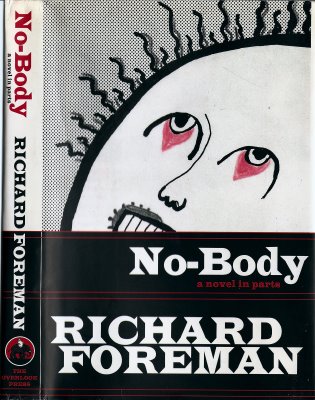For more about this recording please visit: www.nobodyzone.com
Excerpts
Selections from the chapter “The Amateur Genius” (5 mins):
Full chapter “The Amateur Genius” (1 hr 7 mins):
Reactions to the book
“Here is the molten core of Richard Foreman’s visionary theater—stripped of the sets, soundscapes, and choreography. In these often darkly comic prose improvisations, interspersed with startling serial poems, Foreman reveals the unconscious becoming consious of itself. No-Body is Richard Foreman unplugged: shivering and shimmering.”
– Charles Bernstein
“Those who’ve thrilled to the theatrical work of this Obie Award-winning avant-garde dramatist over the past three decades will probably find his first work of fiction equally fascinating, disturbing, and, ultimately, liberating. For the many who haven’t, though, these seven loosely conjoined prose improvisations?and the serial poems that permeate them?offer a literary experience only mildly more diverting than that available in the white pages of any phone book. Foreman’s saving grace is that he explores his ostensible subject, which seems to be the nature of reality, with a deliciously offbeat comic touch. But readers who value such conventional elements as plot and character, not to mention quotation marks, would do well to look elsewhere.”
– David Sowd, Library Journal
“Foreman, founder of the avant-garde Ontological-Hysteric Theater in New York City and a six-time Obie winner, offers a first collection of cryptic, playful, deeply weird tales. Dense as any poem by Wallace Stevens, these six stories offer echoes of the work of Donald Barthelme, Antonin Artaud, Gertrude Stein, William Burroughs, and Samuel Beckett, among others. Many will call it babble as their minds bobble. Bedazzled Foremanians will love it. And still others, tiring of baubles and disapproving of disjunctive sentences that wind left, right, up, down, may simply yawn. Only the most devoted need enter here, those willing to assemble from lyrical fragments some semblance of a tale. For instance, “Eddie,” the first tale, tells us that “Eddie went to Poetry City and there, on one of the major boulevards, met Marie. . . Eddie, like a river, flowed through Poetry City. Reading nothing but signs, and not even reading the signs. . . Eddie went to Poetry City. The light there was the light now. The now.” It pretty much goes on that way, long past the point where Foreman’s rhythmic language can compel. These pieces, it quickly becomes clear, are pitched below the level of logic, aiming for something (but what?) other than a tale. “The Mind King,” a parable about (perhaps) the superego, is wildly disorienting. And that seems to be the whole point: To send the reader down into the unconscious, where one may see anew. “And the past fell away like ice cream into soup,” the author tells us in “The Amateur Genius,” an inspired antistory that toys with the nature of genius–is it a city in flames? “The Suburbanite” locates his house “through memory, through precognition, all things that played through his fingers like the piano that disappeared because who could see through walls?” Cockeyed, sometimes mind-expanding visions. More often, baffling, irritating, and exhausting.”
– Kirkus Reviews
“In his first foray into long-form fiction, subtitled a novel in parts, theater director/playwright Richard Foreman takes the reader on a journey through the mind of a man attempting to be a poet in modern America, living as Ralph Waldo Emerson advised writers to: as a transcendental eyeball, observing the world and discovering its symbols as they reveal themselves. Foreman tells his story through a series of personas: Eddie, the Mind King, The Amateur Genius, The Suburbanite, The Hero Cadmus, Samuel, and Samuel II, each of whom has a different perspective on a surreal world, but each of which seems to be another facet of a single fragmented personality/point of view, accompanied by the same two long suffering women, Helen and Marie. The nonlinear writing style is a direct adaptation of Foreman’s avant-garde stage style in plays like My Head Was a Sledgehammer. Adventurous readers are advised to just read through, and allow the effect to build cumulatively, like that of music. Then to read through again.”
– Amazon.com review
